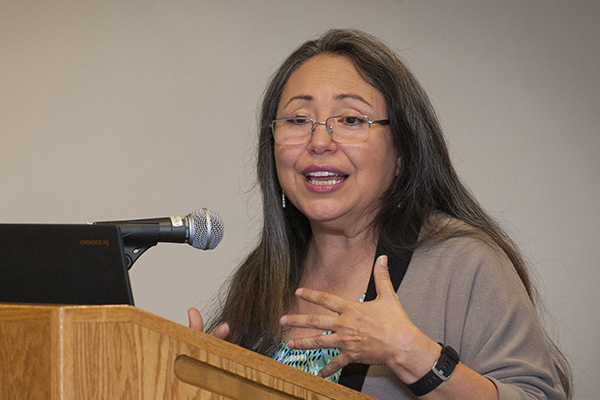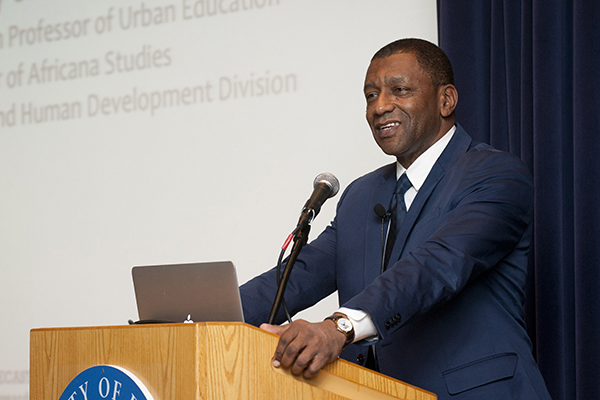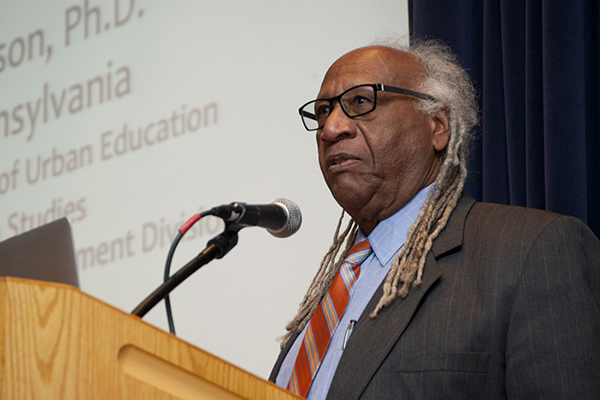


Valuing diversity
Higher education expert discusses research, suggestions for inclusive campuses
10:47 a.m., March 18, 2016--Sylvia Hurtado, a higher education scholar who is known as a national leader and advocate in the study of diversity, told an audience at the University of Delaware on March 16 that being part of a diverse community is an educational experience in itself.
“Why would diversity be related to learning?” she asked, then cited research to provide an answer. “We’re lazy thinkers. … We save our active thinking for times when we’re in new situations” and can’t merely rely on our habits or operate on a kind of autopilot.
People Stories
'Resilience Engineering'
Reviresco June run
Hearing from people with different backgrounds, experiences and views, she said, challenges us to open our minds and think more deeply as we realize “that the world isn’t the way we always saw it.” College students in particular can broaden their education by opening their minds in that way, she said.
Hurtado, professor of education and former director of the Higher Education Research Institute at the University of California Los Angeles, focused most of her talk at UD on research related to students. The lecture, “Social Justice and a Diverse Democracy: Challenges and Opportunities in College,” was part of the Diversity Spring Lecture Series sponsored by the Center for the Study of Diversity, part of UD’s College of Arts and Sciences.
Hurtado has worked with colleges and universities across the country on creating positive campus climates that benefit teaching and learning for all students. She has led several national projects on diverse learning environments and retention, STEM (science, technology, engineering and mathematics) education and diversification of the scientific workforce, and innovation in undergraduate education.
In her talk, she discussed findings from a variety of research reports, including surveys of employers (who increasingly value employees who have the skills to respect and communicate with people of different backgrounds and to work in a diverse environment) and of college students themselves.
Hurtado said that, in those surveys, students from underrepresented groups reported numerous incidents of discrimination and bias on their campuses, most commonly in the form of verbal comments or feelings of being excluded. Those incidents, while often examples of unintentional, or subconscious, bias, came not just from fellow students but also from faculty and staff, she said.
“The more diverse the campus, the more those numbers go down,” she said. “But they never disappear.”
When institutions and individuals seek ways to make their communities more inclusive, the natural tendency is to try to treat everyone as if they were all alike, Hurtado said. That may superficially seem fair, she said, but it ignores the disparities that have been created over time by social systems, structures and individuals.
“Not all students come to higher education in the same way,” she said, and those differences must be taken into account when working to create diverse and inclusive campuses.
She offered suggestions for implementing “promising practices,” including encouraging students to share personal stories and ask questions, using conflict as an opportunity for learning, acknowledging the multiple social identities of individuals and proactively finding ways to make “one and only” or “solo status” students (the only African American student in a class, for example) feel comfortable.
Previous lecture: ‘If Elephants Could Talk’
An earlier presentation in this semester’s Diversity Lecture Series was held March 1, when Howard Stevenson, a University of Pennsylvania professor and author of a book on promoting racial literacy in schools, spoke to an audience of about 100 UD students, faculty and staff, as well as members of the education community.
In his lecture, “If Elephants Could Talk: Racial Literacy,” Stevenson discussed racial encounters and racial stress, including examples of his own experiences growing up in southern Delaware. He spoke about teaching ways to recast racial conflict and led the audience in two exercises focused on racial awareness and encounters.
Stevenson also presented details on his RECAST theory – Racial Encounter Coping Appraisal and Socialization Theory – from his recent book, Promoting Racial Literacy in Schools: Differences that Make a Difference.
After the public lecture, an undergraduate student panel organized by Residence Life and Housing and moderated by Stevenson continued the conversation. Student panelists Garry Johnson, Harry Lewis, George Morales, ChiChi Madukwe, Jahaan Davis and Lovely Lacey discussed their own encounters with race, racism and discrimination and responded to questions from the audience.
Stevenson is the Constance Clayton Professor of Urban Education and professor of Africana studies at the University of Pennsylvania. His work provides strategies to classroom teachers, educational leaders, psychologists and parents on how to develop culturally relevant, strength-based responses and interventions that promote healthier school climates.
More about the lecture series
The Center for the Study of Diversity’s lecture series this semester focuses on several aspects of diversity in higher education, as part of the center’s mission to promote academic research and scholarship that facilitates dialogues on the subject.
The series will continue with two more talks:
On Friday, April 22, Ana Mari Cauce, the new president of the University of Washington, will deliver the 2016 Distinguished Lecture on Diversity in Higher Education, discussing her commitment to inclusivity and the proposition that we can only be better off when we really are all better off. The lecture will be held at 11:30 a.m. in Trabant University Center Theatre.
On Thursday, May 5, Scott Page, a professor at the University of Michigan and director of the Center for the Study of Complex Systems, will present a lecture in UD’s Thought Leader speaker series. Author of The Difference, a classic argument for the benefits of diversity, Page will demonstrate that groups with a range of perspectives outperform groups of like-minded experts and will also show practical ways to apply diversity to a host of problems. His lecture will be held at 4 p.m. in Gore Recital Hall at the Roselle Center for the Arts.
Article by Ann Manser
Photos by Wenbo Fan










